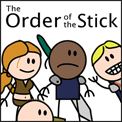Top 50 Books on the Game Industry
This article was making its rounds last week, but remaining true to my own schedule, I figured I'd share it late.
Ernest Adams, author of a number of books on game design, wrote an article for Next Generation entitled "50 books for Everyone in the Game Industry", highlighting 50 of the most influential and insightful works on the topic to date. He breaks them down into twelve categories, such as theory, business, and the history of games, attempting to cover a very broad range of topics that the gaming industry deals with. One of his topics is "inspirations," books "whose influence can be felt in many games" and "have helped make the game industry what it is today":
- The Lord of the Rings, by J.R.R. Tolkien
- Dungeons & Dragons Player’s Handbook, by various authors
- Star Trek, originated by Gene Roddenberry
- The Hunt for Red October, by Tom Clancy
- Watchmen, by Alan Moore and Dave Gibbons
- The Hero with a Thousand Faces, by Joseph Campbell
- Hamlet on the Holodeck: The Future of Narrative in Cyberspace, by Janet H. Murray
As for the rest of the list, I've only read one of the books: Edward Tufte's The Visual Display of Quantitative Information, which I got after attending the author's seminar on visual design a few years ago. I got a lot out of it, and had a chance to speak to the man briefly afterwards. I brought up the topic of user interface design and asked him what he thought of the fact that UI design is not treated as a discipline in its own right. He responded: "That's because it's a solved problem." I was shocked. It was as if, to him, it was somehow entirely clear what the best way to convey information to a user is, and what is the most efficient way to gather input from him. He couldn't have meant that, could he? Even after thinking it over for a good 3 or 4 years since the seminar, it seems obvious that he meant just that. Either he didn't understand my point or he doesn't know what he's talking about.
For those looking for the whole list, I've reproduced it here in title order:
- 21st Century Game Design, by Chris Bateman and Richard Boon
- A Pattern Language, by Christopher Alexander et al
- A Theory of Fun for Game Design, by Raph Koster
- Balance of Power: International Politics as the Ultimate Global Game, by Chris Crawford
- Community Building on the Web: Secret Strategies for Successful Online Communities, by Amy Jo Kim
- Creating the Art of the Game, by Matthew Omernick
- Designing Virtual Worlds, by Richard Bartle
- Developing Online Games: An Insider’s Guide, by Jessica Mulligan and Bridgette Petrovsky
- Digital Game-Based Learning, by Marc Prensky
- Dungeons & Dragons Player’s Handbook, by various authors
- Everything Bad Is Good for You, by Steven Johnson
- Flow: The Psychology of Optimal Experience, by Mihalyi Csikszentmihalyi
- From Barbie to Mortal Kombat: Gender and Computer Games, edited by Justine Cassell and Henry Jenkins
- Fundamentals of Game Design, by Ernest Adams and Andrew Rollings
- Game Over, Press Start to Continue, by David Sheff, with new material by Andy Eddy
- Game Writing: Narrative Skills for Videogames, edited by Chris Bateman
- Gender-Inclusive Game Design, by Sheri Graner Ray
- Half-Real: Video Games between Real Rules and Fictional Worlds, by Jesper Juul
- Hamlet on the Holodeck: The Future of Narrative in Cyberspace, by Janet H. Murray
- Homo Ludens, by Johan Huizinga
- Joystick Nation, by J.C. Herz
- Killing Monsters: Why Children Need Fantasy, Super Heroes, and Make-Believe Violence, by Gerard Jones
- Man, Play, and Games, by Roger Caillois
- Masters of Doom, by David Kushner
- Pause and Effect: The Art of Interactive Narrative, by Mark Stephen Meadows
- Peopleware: Productive Projects and Teams, 2nd edition by Tom Demarco and Timothy Lister
- Pikachu's Global Adventure: The Rise and Fall of Pokémon, edited by Joseph Tobin
- Postmortems from Game Developer, edited by Austin Grossman
- Rules of Play, by Katie Salen and Eric Zimmerman
- Smartbomb: The Quest for Art, Entertainment, and Big Bucks in the Videogame Revolution by Heather Chaplin and Aaron Ruby
- Star Trek, originated by Gene Roddenberry
- Story: Substance, Structure, Style, and the Principles of Screenwriting, by Robert McKee
- Supercade: A Visual History of the Videogame Age 1971 - 1984, by Van Burnham
- The Ambiguity of Play, by Brian Sutton-Smith
- The Design of Everyday Things, by Donald Norman
- The Fat Man on Game Audio: Tasty Morsels of Sonic Goodness, by George Alastair 'The Fat Man' Sanger
- The Hero with a Thousand Faces, by Joseph Campbell
- The Hunt for Red October, by Tom Clancy
- The Lord of the Rings, by J.R.R. Tolkien
- The Mythical Man-Month: Essays on Software Engineering, by Frederick P. Brooks
- The Oxford History of Board Games, by David Parlett
- The Ultimate History of Video Games, by Steven L. Kent
- The Visual Display of Quantitative Information, Visual Explanations and Envisioning Information, all by Edward Tufte
- The Xbox 360 Uncloaked by Dean Takahashi
- Trigger Happy: The Inner Life of Videogames, by Steven Poole
- Understanding Comics, by Scott McCloud
- Understanding Media: The Extensions of Man, by Marshall McLuhan
- Unit Operations: An Approach to Videogame Criticism, by Ian Bogost
- Watchmen, by Alan Moore and Dave Gibbons
- What Video Games Have to Teach Us About Learning and Literacy, by James Paul Gee
Labels: Raph Koster

 RSS
RSS Anonymous at Friday, October 20, 2006 12:31:00 PM
Anonymous at Friday, October 20, 2006 12:31:00 PM


